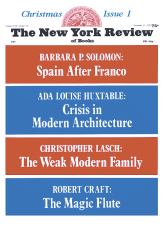In response to:
Hello to All That from the October 16, 1975 issue
To the Editors:
This letter is prompted not by Karl Miller’s review, “parts of which might seem a little Danish,” of Journey To The Trenches, my book on Isaac Rosenberg [NYR, October 16], but by his expression of surprise over my having once defended Wilfred Owen’s mother for her “Christian act” of superimposing her convictions of immortality on her dead son by playing loose with lines from “The End’ inscribed on his tombstone. The fact is I never defended that lady. The “pamphlet” referred to by Mr. Miller amounted only to a few paragraphs on one sheet of paper, and it was my final comment in a controversy with Professor Dennis Welland over Owen that erupted in the TLS in 1956. I felt it was necessary then to challenge Professor Welland on his sources for his charge that Mrs. Owen was responsible for the inscription. It may be a moot point today but it was not back then. Out of a sizable number of essays I have published on Owen, this slight relic was the only thing of mine Jon Stallworthy mentioned in his biography, and it was his misinterpretation of my intention upon which Mr. Miller seized.
Mr. Stallworthy’s reasons for ignoring my work on Owen are obvious: his book, while it contains some good things, is, apart from being dull, the latest and most sophisticated effort to maintain the long-standing conspiracy of silence surrounding Owen’s sexual proclivities. Mr. Stallworthy must surely have had my detailed article on Owen’s homosexuality, Owen Agonistes (1965), at hand when he was writing, but apparently he chose to disregard it just as he ignored—as Mr. Miller observes—Robert Graves’ description of Owen in Goodbye To All That as “an idealistic homosexual with a religious background.” The conspiracy succeeded for a time from 1920, when Mrs. Owen and Siegfried Sassoon initiated it, until the 1950s when an ever increasing number of students and researchers refused to be put off, at that point by Harold Owen, any longer. Mr. Stallworthy would probably deny that there was or is any conspiracy of silence, but then denials are natural concomitants to such intrigues.
That this conspiracy is futile, however, may be observed from Paul Fussell’s excellent discussion of Owen’s “homoerotic sensuousness” (an overly restrained term, in my opinion, understating the presence of homosexual fire amid so much literary smoke!) in The Great War and Modern Memory; and in the extensive coverage given to this aspect of Owen’s life by several of Mr. Stallworthy’s reviewers, notably Philip Larkin in Encounter (March 1975), and Mr. Miller here. Both Philip Larkin and Paul Fussell saw and used Owen Agonistes because they both refer specifically to a comment of mine, which Mr. Miller repeated in his review, to the effect that Harold Owen asked that Graves’ reference to his brother’s homosexuality be excised from the 1957 reissue of Goodbye To All That. Actually Harold did not make that request, and I hope I may have the hospitality of your columns a moment longer to correct this impression before it is further cemented into the record. When Graves’ autobiography was reissued in 1957 I wrote him to ask why the description was deleted in Great Britain but not in America. He replied—and I trust he will not object to my quoting him briefly—that “…someone in Cassell’s London office knew Harold Owen (I was unaware of his existence) and he wrote to ask me to revise the passage, which I did; but the Anchor Books edition had already gone to the machines and it was too late to change it there.” When I subsequently wrote Owen Agonistes I assumed the antecedent of Graves’ “he” was Harold Owen as may be inferred from the text, but the reference was in fact to the “someone” at Cassells.
Probably Harold Owen and Graves never communicated at all with one another. The recent sale of Siegfried Sassoon’s library and papers at Christies makes it clear from letters of Mrs. Owen to Sassoon that the Owen family was greatly distressed over Graves’ description including the “accusations of cowardice” (p. 91 Christie’s Catalogue, June 4, 1975). This charge was always a sore point with Harold, and his sensitivity over it would have likely precluded contact with Graves. As to that charge Mr. Miller speculates that it “may be one of the tall stories in Graves’ autobiography.” I would like to suggest that it is not, though my reason for saying so and the evidence underlying it is sufficiently extensive to require a long chapter in a book I am preparing to write. For now, suffice it to say that Owen’s alleged cowardice was thoroughly aired in the London papers in 1920-1921 by several writers who preceded Graves, including C. K. Scott-Moncrieff, John Middleton Murry, Robert Nichols and Edith Sitwell. A reading of Scott-Moncrieff’s published notes on Owen in conjunction with Owen’s references to him in his letters convincingly legitimize Graves’ assertion. Of course, Owen proved himself no coward in combat, but doesn’t everybody know that by now?
David Levine’s drawings of Owen and Rosenberg are, by the way, remarkably perceptive and marvelously complement Mr. Miller’s extremely interesting review.
Joseph Cohen
Tulane University
New Orleans, Louisiana
This Issue
November 27, 1975



